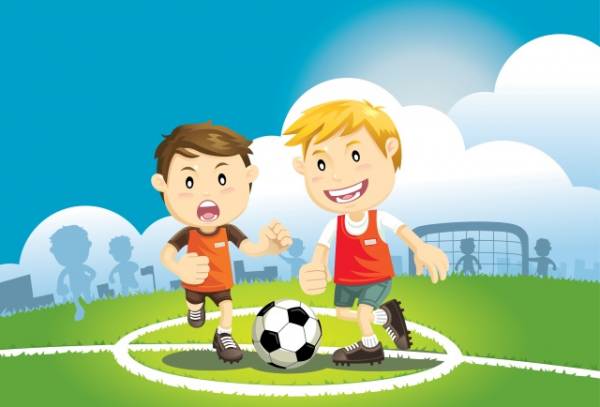Getting away from the participation ribbons and trophies (specifically referencing the child who never makes practices/games until the day when ribbons and trophies are handed out), the false encouragement of a “Way to go!” (when really, it was not the way to go), and the shallow, “Great game!” (to a child who did not perform well), how can we, as parents, coaches, and trainers truly encourage and nurture a young athlete’s self-esteem?
Acknowledging the controversy over rewarding children for registering for and/or participating in a sport and the “everyone who pays, plays” school of thought, this article is about developing and nurturing self-esteem, so the individual athlete is aware of, and has an innate sense of, his or her self-esteem.
How to Nurture Self Esteem
There are so many variations defining the word “self-esteem” that it is easy to make the word fit any purpose. Dependent upon the resource referenced, the definition of self-esteem can be, among many others, “self confidence,” “acknowledging all of one’s abilities and competencies,” and “our ability to assess ourselves accurately and still be accepting of who we are.” While these varied definitions are merely a brushstroke of what self-esteem truly encompasses, let’s start with the essence of the definition.
According to the Merriam-Webster Dictionary:
- self–es·teem noun -?-?st?m: a feeling of having respect for yourself and your abilities;
- a confidence and satisfaction in oneself: self-respect
This is an easily understood definition. Now, let’s apply this term, as it stands, to the youth athlete. The athlete has self-respect for him- or herself, not only as an athlete, but as a person, and the athlete has respect for his or her athletic skills and abilities. Note that this is an internal reading measured by the athlete. It is not an external judgment made by a parent, coach, trainer, or teammate.
Do the parents, coaches, trainers, and teammates factor in and contribute, in an external way, to an athlete’s self-esteem? Absolutely, but again, the athlete’s self-esteem is an internal measure of self worth, as an athlete and as a person. Whether or not the athlete accepts external comments, opinions, and judgments and whether or not the athlete uses these observations for internal measurements is dependent upon the individual athlete.

Parents, coaches, and trainers are, in many ways, responsible for nurturing an athlete’s self-esteem. In this respect, I am not talking about participation ribbons and trophies. While these can and do have their place in youth athletics, especially for beginning athletes, these tokens are merely external signs that recognize performed skills and abilities, and sometimes, not even that. While extrinsic rewards are certainly powerful motivational tools, they do not build an athlete’s self-esteem. The athlete’s internal self-respect and recognition of his or her abilities is what builds his or her self-esteem.
How can parents, coaches, and trainers positively nurture self-esteem in a youth athlete? After researching many articles and resources, it is evident that there is no clear answer, and just as evident that there are no same two answers. In my opinion, and based on my years of coaching and training young athletes, I believe that Dr. Patrick Cohn’s article, 7 Ways to Help Your Athlete Play with More Confidence, grasps the essence of building self-esteem in a youth athlete. Here is my explanation of his seven points:
Let Go of Fear
Most athletes fear making a mistake in the game, of letting their team down, or of not making “the” play that causes the team to lose an important game. By understanding that athletes will make mistakes, by allowing athletes to make mistakes, and by allowing athletes to learn from those mistakes, coaches can help athletes lose their fear, and subsequently, the athletes can play a harder, more focused game.
Play Freely Instead of Holding Back
The ability of an athlete to believe in his or her training and to know that he or she is ready for the game or event can help an athlete perform optimally. Knowing and believing that the athlete has done everything possible to prepare for the event not only gives the athlete a mental edge over the competition, but also increases the athlete’s belief in his or her skills and abilities. The athlete’s knowledge and belief in his or her skills allows for freely applying these abilities needed during the competition.

Make No Comparisons
This statement is applicable to athletes, parents, coaches, and trainers. Each athlete must be looked at individually, as a valuable asset to the team, and each athlete should understand the value that he or she brings to the team. Again, the athlete should respect, recognize, and believe in his or her athletic abilities and skills.
Play for Yourself, Not Others
Sporting events are social events, especially for youth athletes. Peer pressure and social approval may easily become the reason for playing a sport. With the guidance of parents, coaches, and trainers, it is important to help the youth athlete realize that his or her athletic performance does not define who he or she is – it is just another dimension of who he or she is. While this is easier said than done, in the end, an athlete’s performance is just that – his or her performance.
Don’t Try to be Perfect
This just never works and most times ends badly. Coaches and trainers must allow for mistakes. Athletes must believe in their training, abilities, and skills, and they must understand that mistakes are learning opportunities. Parents must support their athlete whether or not the athlete performs optimally.
Be Confident
The athlete must have confidence in the hours spent mentally and physically preparing for the event – the repetitions, the workouts, and the coaching. The athlete must believe in his or her training, believe in his or her abilities and skills, and believe in his or her past experiences to prepare for and perform well in the event.

Focus on the Process, Not Results
Process refers to the athletic performance, right here, right now. The athlete is focused and in the moment, blocking distractions. A perfect example of this is a baseball pitcher. Even with a count of three balls and no strikes, a pitcher who is in the moment is focused on the process of each individual pitch. Relying on his or her training, skills, and abilities, the pitcher can strike the batter out.
Develop the Whole Person
The athlete who has self-respect for him- or herself, not only as an athlete, but also as a person, and the athlete who has respect for his or her athletic skills and abilities is an athlete with good self-esteem. Just as developing athletes continue to work on and hone their athletic skills and abilities, coaches, trainers, and parents should continue to develop and nurture the athlete’s self-esteem. This is our role – to develop and nurture the athlete’s self-esteem not only as an athlete, but as a whole person.
References:
1. Cohn, P. “7 Strategies to Help Your Athlete Be More Confident.” Colorado Avalanche Cares. Accessed 09/08/14.
2. CHMC. “Self-Esteem” The University of Texas. Accessed 09/07/14.
3. Chertok, G. “Fostering Healthy Self Esteem in Youth Athletes.” Professional Sport Psychology Symposium. Accessed 09/07/14.
4. Competitive Advantage. “Self-Confidence.” Competitive Edge. Accessed 09/07/14.
5. Merriam-Webster. “Self-Esteem.” Accessed 09/07/14.
Photos courtesy of Shutterstock.






